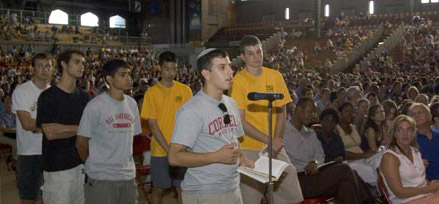Students and faculty come together for 'Things Fall Apart'
By Kerry Gilfillan

As Provost Biddy Martin ushered new students into their first intellectual investigation at Cornell on Aug. 21, a ripple of waving paperbacks cooled the sea of faces in Barton Hall's 2-acre cavern. Padding between rows of chairs on the rubberized floor, members of the news media documented the student response.
More students were brought together to talk about Chinua Achebe's novel "Things Fall Apart" than for any of Cornell's previous New Student Reading Projects. In addition to more than 3,000 incoming freshmen, 24,000 alumni and nearly 6,000 high school students were turning the pages of Achebe's celebrated work this summer.
Achebe, 75, will give a public reading at Cornell Sept. 15 and will later meet with the authors of 10 winning student essays on his novel.
Professor Nicolas van de Walle, associate dean for international studies in the College of Arts and Sciences, began the examination of "Things Fall Apart" by looking at the historical cleavages in Nigeria that followed the colonial intervention. At independence, van de Walle said, "The rest of [Nigeria] perceived the Ibo to be the main and disproportionate beneficiaries of colonialism, and envy of the Ibo would shape the ethnic identities that were beginning to emerge in the rest of the colony."
Professor Biodun Jeyifo, associate chair of the English department, opened his speech on the novel with the comment, "For heaven's sake!" -- a frustrated exclamation about the complexity of the subject to be squeezed into his brief stretch at the podium.
Giving his 10-minute lecture before flying to London, Jeyifo described how, in an attempt to make sense of historical and social forces, the novel's narrative "represses and ignores" marginal stories that complicate grand narratives.
Natalie Melas, director of graduate studies in comparative literature, described the flawed Western presumption of cultural universality, a presumption that shows itself in the West's attempts to "explain" the behavior of members of traditional societies. "The modern society is thought to have culture," she explained, "while the premodern or traditional is thought to be culture. The modern individual produces culture, while the traditional individual is determined by culture."
After teasing the fabric of the book apart, the students and faculty stitched it back together in a discussion ranging from classical to Marxist interpretations. The discussion was broadcast live locally and is available online from the New Student Reading Project Web site, http://reading.cornell.edu/panel.html.
Kerry Gilfillan is an intern at the Cornell News Service.
Media Contact
Get Cornell news delivered right to your inbox.
Subscribe